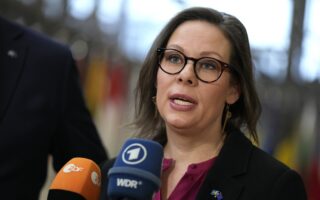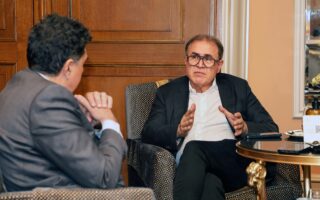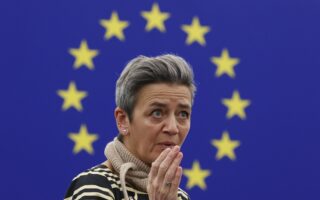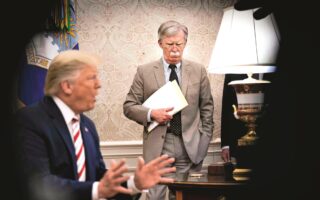‘It is time’ for strategic autonomy in the EU
During a visit to Athens and ahead of elections for new MEPs, Europe’s top lawmaker stresses need to bolster the Union inside and out
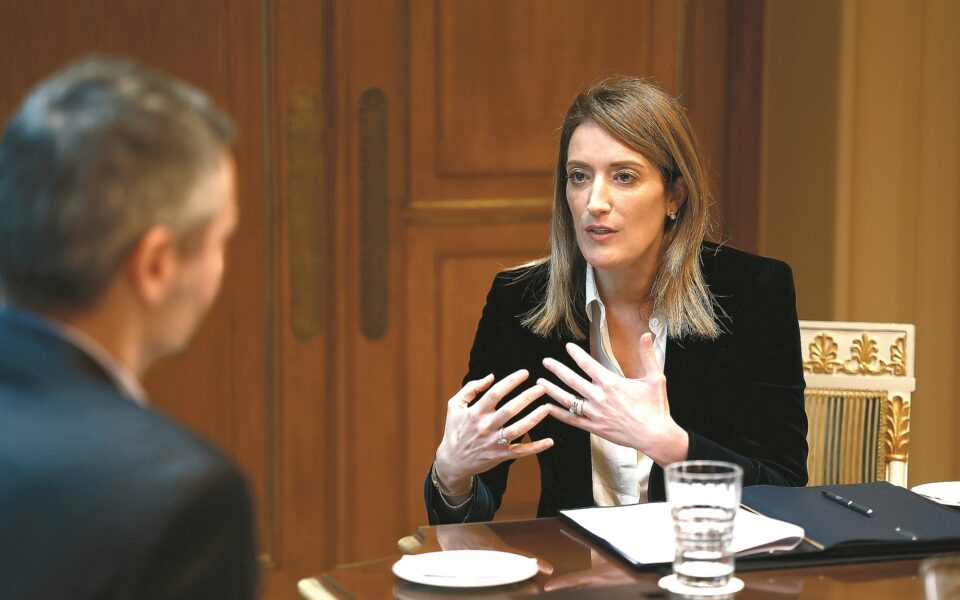
The steps toward upgrading the European defense structure are outlined in a Kathimerini interview with the president of the European Parliament, Roberta Metsola. Specifically, she proposes integrating the existing European Peace Facility (EPF) into the European framework and advocates for the appointment of a commissioner for defense. She also indirectly but clearly references the mutual defense clause provided for in the Lisbon Treaty, in accordance with Article 51 of the United Nations Charter.
A few months before the European Parliament elections, Metsola urges the political center to develop “a counternarrative” against those “that seek to destroy rather than build.” Regarding the debate about the rule of law in Greece, she distances herself from both the contentious resolution of the European Parliament and its critics.
The parties affiliated with populist or far-right ideologies are expected to significantly strengthen their forces in the upcoming European Parliament elections. What, in your view, is driving this trend?
I would say that for many years, we took our voters for granted. This may have led them to seek solace in the political fringe, without realizing that these are forces that seek to destroy rather than build. What is needed now is a counternarrative coming from the center of the political spectrum – where the majorities are concentrated – focusing on migration, climate, digital future, and security. So that we can truly improve the lives of European citizens. We need to re-engage with the people, which is why I am not speaking to you from Strasbourg or Brussels right now. I am in Athens to convey that we can once again persuade Europeans to vote for the center that has always made responsible decisions, explained them, and ensured social and economic “cushions” for everyone.
Does the strengthening of the populist bloc perhaps signify, to some extent, the failure of European policies in recent years? In your opinion, is there an area where Brussels ought to have performed better?
Europe has faced numerous challenges, including a global pandemic, a war on our continent, an energy crisis, and soaring inflation, all while grappling with the climate crisis and geopolitical instability. I am proud of our united response to these challenges. We were not perfect, but we stood together and demonstrated that our solidarity can prevail. It’s easy to present a black-and-white narrative rather than a constructive, pro-European, centrist narrative. I am convinced that by challenging the simplistic narrative and explaining why decisions are made and why Europe continues to succeed, people will turn out to vote. Let’s not take Europe for granted.
Are you concerned that a greater representation of Euroskeptic forces could complicate the decision-making process in European bodies?
It is already challenging. The European Parliament is the only directly elected body, and the decision-making process necessitates forming majorities, which vary depending on the issue at hand. For instance, in matters of migration, we often see the EPP (the conservative European People’s Party) aligning with the (Socialist) S&D and the liberals (the Renew Europe Group). In climate legislation, alliances emerge between the EPP, the S&D, the Liberals, and the Greens. In security, the conservatives find themselves included. So vigilance is imperative. For programs like Erasmus or Horizon, which allocate funds to member-states, we require robust majorities. While I wouldn’t say I’m worried or speculate on election outcomes, we will undoubtedly work with what we have. I am confident that with a strong campaign, constructive forces will unite to progress over the next five years.
Donald Trump has challenged the framework underpinning the transatlantic alliance through NATO and currently leads in Republican primary polls. Is it time, perhaps, to re-examine the scenario of European autonomy? There are proposals, such as setting up a common fund to finance European defense, on the table.
‘What is needed now is a counternarrative coming from the center of the political spectrum’
Indeed, it’s time to reassess our strategic autonomy, ensuring our citizens feel safe and protected, capable of standing on our own. We already possess the European Peace Facility (EPF), and we should explore how we can integrate it into the European framework. A genuine security and defense union is essential, one that complements rather than competes with NATO, preserving the autonomy of each member-state while ensuring collective defense in the event of an attack. This is particularly crucial today. Take a look at events unfolding in the Red Sea, which impact shipping, security, and maritime domains. Discussions are currently under way in the European Parliament regarding the potential upgrading of the Political and Security Committee (PSC) and the creation of a commissioner for defense. In the next Commission term, seamless cooperation between the High Representative of the European Union for Foreign Affairs and Security Policy, a commissioner for defense, and the European Parliament should be prioritized.
Greek farmers staged a rally at Syntagma Square as part of a broader mobilization. Is the green transition, finally, too costly for agricultural production? What can farmers expect from Brussels?
The message to farmers must be perfectly clear: We see you, we hear you, and we will assess whether some of our decisions have progressed too rapidly or without adequate social and economic support. There exists an invisible line we must not cross, lest we lose touch with our citizens. Especially concerning the agricultural sector, we cannot pursue a green transition without considering those who ensured food security at the onset of the pandemic, who contribute significantly to our daily sustenance. Issues such as dumping, low-quality imports, burdensome levies, and skyrocketing fuel costs I believe can be addressed, potentially through EU funds. However, above all, we must make clear to them that we need them. Every protest carries a message, and it’s crucial that we take that message seriously.
Now, turning to another issue: Corruption is part of life. The question is what can be done to limit the space where it manifests itself. Has the European Parliament gleaned any lessons from the Qatargate scandal?
First of all, corruption must not be part of life. Personally, I have pursued my career while advocating against corruption and striving to demonstrate every day that politics can be a force for good. It’s crucial to emphasize that the allegations [surrounding Qatargate] remain just that – allegations. The presumption of innocence must be upheld, as investigations are ongoing. It’s important to clarify that the actions of a few individuals do not represent the entire European Parliament or the European Union. Therefore, we’ve embarked on a significant reform, long overdue, aimed at promoting integrity and accountability within the Parliament. It’s a cleansing process that reaffirms our commitment to legislate with honor and pride, in line with the expectations of the citizens we serve. And it is exactly this work that must be rewarded, rather than dwelling on the alleged actions of a small number of individuals.
The European Parliament recently adopted a resolution, tabled by four political groups, criticizing the state of rule of law in Greece. From your standpoint, do you see any concerns regarding the rule of law in Greece?
This is a matter I’ve discussed here in Athens with the prime minister, the president of the Republic, opposition leaders, and youth, in the spirit of cooperation and dialogue. As president of the European Parliament, I have to work with the outcomes of resolutions passed by the Parliament. It’s important to consider the perspective expressed recently by the Supreme Court. Additionally, I understand that the government will address the various points raised in the resolution, as is customary. It’s worth noting that the European Parliament has long been committed to producing an annual report on the state of the rule of law in each member-state. These reports aim to encourage member-states to take steps to improve or expedite legal procedures. I am confident that discussions will continue in this context, taking into account the relevant reports.
Would you care to comment on the case of Fredi Beleri? I ask because it pertains to the rule of law in Albania, a country with EU candidate status.
The [European Commission] report, endorsed by the European Parliament, expressed clear concern regarding the arrest of Fredi Beleri, the newly elected mayor of Himare, which violated the presumption of innocence and prevented him from assuming his duties, as he remains in detention to this day. The report also highlighted that this issue is linked to the broader respect for fundamental rights, particularly concerning the Greek minority properties in the municipal unit, and allegations of state encroachment. I eagerly await a resolution to this matter and hope an agreement will be reached soon.
This interview was translated from the Greek.
